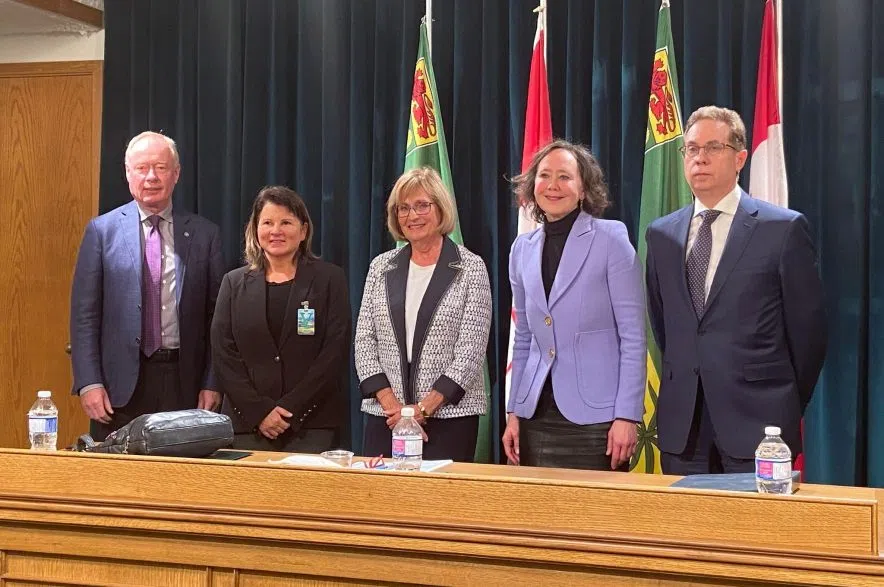Saskatchewan’s battle with Ottawa continues as the province has added a new tool to help fight federal policies.
On Tuesday, the Saskatchewan government announced an Economic Assessment Tribunal created under the Saskatchewan First Act. The tribunal will examine federal laws and programs and put a dollar value on what the government calls potential harms to the province.
The tribunal will start by reviewing the federal government’s proposed Clean Electricity Regulations.
Justice Minister Bronwyn Eyre said the federal government refuses to collaborate fairly, so the province is taking matters into its own hands.
“We are at the moment in a bit of a vortex when it comes to facts,” she said. “We need as a province, and I believe as provinces, to begin to say, ‘This isn’t collaborative,’ and we need to establish our own fact base,” she said.
Tribunal chair Michael Milani, a senior partner at law firm McDougall Gauley LLP in Regina, said the tribunal’s process and goal is simple.
“What it is doing is gathering information that we need to make our assessment,” he said. “That information could come from different sources. It may be conducting research studies, interviews (or) surveys. It will be reviewing data and information that has already been produced. It may be that industry representatives will be asked to provide submissions to us.
“Our goal is to ensure that our process is transparent and thorough, and independent. We do not have a mandate to make any determination in any direction. We are tasked with looking at the consequences and providing information through our report.”
Eyre said the main focus and importance of the work is to find a dollar value to federal policies, claiming that the federal government doesn’t do that itself.
“When it starts to or attempts to, it’s much more of a national look at cost and not zeroing in on specific provincial realities. The value of the tribunal and the value to us will be to really get that economic and dollar figure sense of what we in Saskatchewan are facing — not the west, not Alberta and Saskatchewan, but we in Saskatchewan because we face such different realities,” explained Eyre.
The information gathered could be used as evidence in legal action or seeking an injunction or simply to raise awareness. The tribunal will also assess if the policies may cause irreparable harm in terms of dollar amount. If harm is identified, the Saskatchewan government could submit that information as evidence.
Eyre said the information found from the reports will be useful to many across the country.
“I know that we will analyze and review and consider the recommendations in great detail because it’s information that we need, that the province needs and information that the country and federal government needs,” she said.
The tribunal will focus on three main areas: The Clean Electricity Regulations, federal fuel standards, and the oil and gas caps.
The first report on the Clean Electricity Regulations is expected to come out in May. Eyre is looking forward to seeing the report.
“I for one will be panning through it with a fine tooth comb because I think it will be genuinely helpful to put into context and perspective what we are dealing with as a province and an economy,” she said.
Some tribunal members have a background in oil, gas and politics. A criticism of the panel’s makeup raised during a media scrum was that none of the members appear to have a strong environmental background. Eyre wasn’t concerned by that.
“Certainly the individuals on this panel have all cross-referenced economic and environmental considerations in past work,” she said. “That’s why I believe, certainly based on the qualifications, they are more than able to cross-reference those multiple angles to the issues they are considering and federal policies they are considering.”
Tribunal members are appointed for a three-year term and will operate under the Ministry of Justice.
Joining Milani on the panel will be Dr. Janice MacKinnon, a former NDP finance minister of Saskatchewan. She will serve as the group’s vice chair.
The remainder of the tribunal will comprise: Kenneth From, a former CEO of SaskEnergy and the Petroleum Technology Research Centre; Dr. Stuart Smyth, a professor of agricultural and resource economics at the University of Saskatchewan; and Estella Peterson, an oilsands heavy equipment operator from the Cowessess First Nation who serves as part of Suncor Energy’s Aboriginal Ambassador program.
Alberta is also concerned with the federal government’s proposed Clean Electricity Regulations.
On Monday, Alberta used its sovereignty act for the first time, tabling a motion to empower Alberta officials and regulators to not co-operate with the federal rules.
— With files from The Canadian Press











